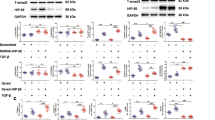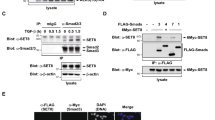Abstract
Transforming growth factor-[beta] (TGF-[beta]) is a multifunctional cytokine of key importance for controlling embryogenesis and tissue homeostasis. How TGF-[beta] signals are attenuated and terminated is not well understood. Here, we show that TMEPAI, a direct target gene of TGF-[beta] signaling, antagonizes TGF-[beta] signaling by interfering with TGF-[beta] type I receptor (T[beta]RI)-induced R-Smad phosphorylation. TMEPAI can directly interact with R-Smads via a Smad interaction motif (SIM). TMEPAI competes with Smad anchor for receptor activation (SARA) for R-Smad binding, thereby sequestering R-Smads from T[beta]RI kinase activation. In mammalian cells, ectopic expression of TMEPAI inhibited TGF-[beta]-induced PAI-1 production, whereas specific siRNA-mediated knockdown of TMEPAI expression potentiated TGF-[beta]-induced Smad2 phosphorylation and cellular responsiveness by TGF-[beta]. Consistently, TMEPAI inhibits activin-mediated mesoderm formation in Xenopus embryos. Taken together, TMEPAI participates in a negative feedback loop to control the duration and intensity of TGF-[beta] signaling.
Similar content being viewed by others
Article PDF
Author information
Authors and Affiliations
Corresponding author
Rights and permissions
About this article
Cite this article
Itoh, S., Watanabe, Y., Satoh, K. et al. TMEPAI, a transmembrane TGF-β-inducible protein, sequesters Smad proteins in TGF-β signaling. Nat Prec (2007). https://doi.org/10.1038/npre.2007.1403.1
Received:
Accepted:
Published:
DOI: https://doi.org/10.1038/npre.2007.1403.1



